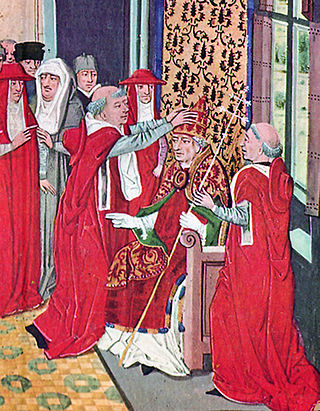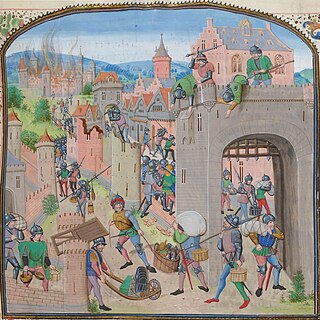
Charles V, called the Wise, was King of France from 1364 to his death in 1380. His reign marked an early high point for France during the Hundred Years' War as his armies recovered much of the territory held by the English and successfully reversed the military losses of his predecessors.

Joanna of Bourbon was Queen of France by marriage to King Charles V. She acted as his political adviser and was appointed potential regent in case of a minor regency.

Charles of Blois-Châtillon, nicknamed "the Saint", was the legalist Duke of Brittany from 1341 until his death, via his marriage to Joan, Duchess of Brittany and Countess of Penthièvre, holding the title against the claims of John of Montfort. The cause of his possible canonization was the subject of a good deal of political maneuvering on the part of his cousin, Charles V of France, who endorsed it, and his rival, Montfort, who opposed it. The cause fell dormant after Pope Gregory XI left Avignon in 1376, but was revived in 1894. Charles of Blois was beatified in 1904.

The Battle of Brignais was fought on the 6th of April 1362, between forces of the Kingdom of France under Count Jacques de Bourbon, from whom the later royal Bourbons descend, and the Tard-Venus Free Companies, led by mercenary captains including Petit Meschin and Seguin de Badefol.
Philippe Mouskes was the author of a rhymed chronicle that draws on the history of the Franks and France, from the origins until 1242.

Guy of Boulogne was a statesman and cardinal who served the Avignon Papacy for 33 years. He participated in the papal conclaves of 1352, 1362 and 1370, and was the Subdean of the Sacred College of Cardinals. His diplomatic postings were extensive, including Hungary, Italy, and Spain. He headed an effort to end the Hundred Years' War. The historian Kenneth Setton called him "one of the commanding figures of his day, and the letters of Petrarch abound with references to him".
Tard-Venus were medieval groups of routiers that ravaged Europe in the later years of the reign of King John II of France.

Seguin de Badefol was a Medieval leader of a large bandit army or routier With 2000 troops he was the head of the largest group of Tard-Venus.

Bascot de Mauléon was a Basque soldier, mercenary and Brigand of the Hundred Years' War in the 14th century.

Perin de Sasine, known by his alias Le Petit Meschin, was a French soldier, mercenary and brigand of the Hundred Years War in the 14th century.

Hagre l'Escot was a Scottish mercenary captain during the Hundred Years War.

Francois Hennequin, was a mercenary captain during the Hundred Years War.

Robert Birkhead (Briquet) was a mercenary captain during the Hundred Years War.

John Creswey was an English mercenary captain during the Hundred Years War.

Aymon of Ortinge, also known as Amanieu d'Ortigue or Amanieu de l'Artigue, was a French mercenary captain during the Hundred Years' War. His story is mentioned in the Chronicles of Froissart.

Bernard de la Salle, was a French mercenary captain during the Hundred Years War. His story is mentioned in the Chronicles of Froissart.
Bernard de Wisk was a mercenary captain and sometime brigand of the Hundred Years War.

Bour de Breteuil was a mercenary captain of the Hundred Years War.

Bour Camus, or Camus Bour Lesparre, also known as Camus the Bastard was a mercenary captain during the Hundred Years War. He was of Navarrese or Gascon origin.

Bertucat d'Albret was a medieval mercenary leader of a bandit army in the Hundred Years' War.






